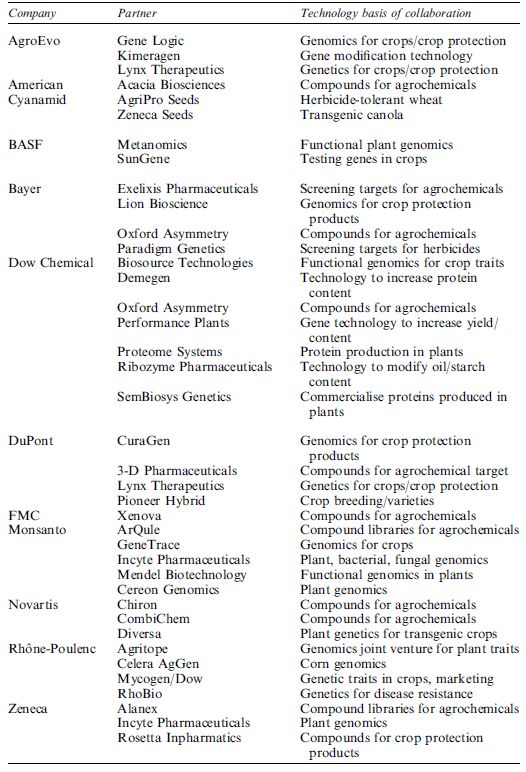


 النبات
النبات
 الحيوان
الحيوان
 الأحياء المجهرية
الأحياء المجهرية
 علم الأمراض
علم الأمراض
 التقانة الإحيائية
التقانة الإحيائية
 التقنية الحيوية المكروبية
التقنية الحيوية المكروبية
 التقنية الحياتية النانوية
التقنية الحياتية النانوية
 علم الأجنة
علم الأجنة
 الأحياء الجزيئي
الأحياء الجزيئي
 علم وظائف الأعضاء
علم وظائف الأعضاء
 الغدد
الغدد
 المضادات الحيوية
المضادات الحيوية|
Read More
Date: 20-1-2021
Date: 22-12-2020
Date: 19-12-2020
|
Intellectual Property
Because of patenting of novel genes, promoters, generic technology and applications, the commercialisation of plant biotechnology can be a complex issue. The costs associated with establishing, contesting, defending and monitoring patents are a major reason why large life sciences companies rather than public organisations (universities and government-funded research institutes) are exploiting the new technologies.
This trend will undoubtedly continue and the major companies listed in Table , such as Monsanto, DuPont-Pioneer and Novartis, will increase their hold on commercialisation. Plant breeding is already essentially in the private domain in Europe and is rapidly moving that way in North America and Australia.
Although intellectual property and patents must now be considered from the start of any scientific work in molecular biology that is intended to be commercialised and freedom to operate from gene to the sale of seeds established, there is another level to consider, that is, the
ownership of germplasm. Breeding materials from many crops often originate in centres of origin which are frequently in developing countries, in which germplasm may be held by international research centres.
The countries where the germplasm originated may well require some equity or payment for use of their germplasm and accusations of ‘biopiracy’ have been made against breeders in developed countries. Greater sensitivity will be needed in this area if access to new or wild germplasm is not to be blocked.
Table : Major companies involved in commercialisation of transgenic crops and their alliances .




|
|
|
|
دخلت غرفة فنسيت ماذا تريد من داخلها.. خبير يفسر الحالة
|
|
|
|
|
|
|
ثورة طبية.. ابتكار أصغر جهاز لتنظيم ضربات القلب في العالم
|
|
|
|
|
|
|
العتبة العباسية المقدسة تقدم دعوة إلى كلية مزايا الجامعة للمشاركة في حفل التخرج المركزي الخامس
|
|
|